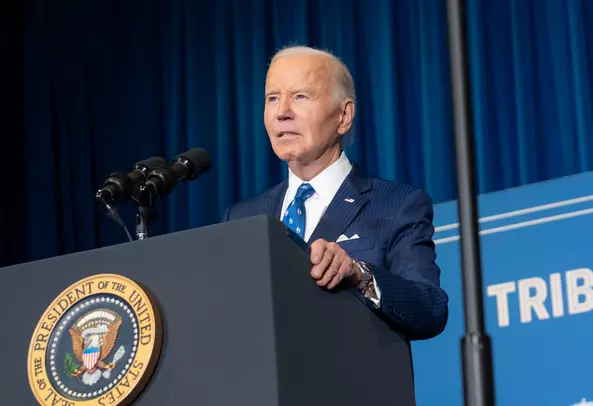
Washington: The outgoing Biden administration has relaxed rules for H-1B visas that will make it easier for U.S. companies to hire foreign workers with special skills and facilitate a smooth transition from F-1 student visas to H-1B visas. To benefit thousands of Indian tech professionals.
The most sought-after H-1B visa is a nonimmigrant visa that allows U.S. companies to hire foreign workers in specific occupations that require theoretical or technical expertise.
Technology companies depend on it to recruit tens of thousands of employees every year from countries like India and China.
The rule announced Tuesday by the Department of Homeland Security (DHS) aims to provide employers and workers with more flexibility by modernizing the definition and criteria for specific positions and nonprofit and government research organizations. -1B visa.
This change will help US employers hire according to their business needs and remain competitive in the global marketplace, the official statement said.
President-elect Donald Trump will take office as the next President of the United States after his inauguration on January 20.
According to DHS, the rule also extends some flexibilities to students with F-1 visas seeking to change their status to H-1B to avoid obstacles to legal status and employment authorization for students with F-1 visas.
This will allow the US Citizenship and Immigration Services (USCIS) to quickly process applications for the majority of individuals previously approved for H1-B visas.
It would allow H1-B visa holders with a controlling interest in a petitioning entity to qualify for H-1B status subject to reasonable conditions. The outgoing Biden administration’s latest move builds on previous efforts to ensure that the labor needs of American businesses are met to reduce undue burdens on employers by complying with all American worker protections under the law.
American businesses rely on the H-1B visa program to recruit high-skilled talent, which benefits communities across the country, said Homeland Security Secretary Alejandro N. Mayorkas.
These reforms to the program provide employers with more flexibility to hire global talent, increase our economic competitiveness and provide highly skilled workers to continue to drive American innovation, he said.
The H-1B program was created by Congress in 1990, and there is no doubt that it needs to be modernized to support our nation’s growing economy, USCIS Director Ur M. Jaddou said.
The changes in the final rule will ensure that U.S. employers can hire the highly skilled workers they need to grow and innovate while increasing program integrity, he said.
DHS has stated that the rule strengthens the integrity of the program by codifying USCIS’ authority to monitor and impose penalties for failure to comply; The employer must establish that there is an actual position in the particular occupation available for the worker as of the requested start date.
It clarifies that the labor condition application must support and be reasonably consistent with the H-1B petition; and require the petitioner to have legal presence and be subject to legal process in the courts of the United States.
To implement the rule, a new version of Form I-129, Petition for Nonimmigrant Worker, will be required for all petitions beginning on January 17, 2025, the effective date of the rule.
DHS through USCIS is legally limited to awarding 65,000 H-1Bs per year, including an additional 20,000 for applicants with advanced degrees, but many nonprofits are exempt from that cap.
H-1B petitions subject to the cap routinely exceed the number of legally available visas, which are issued annually at the beginning of the fiscal year. Applicants are selected for review by a lottery system, meaning that qualified applicants are often rejected due to chance.
Cap-exempt organizations can petition for H-1Bs year-round, and they are not subject to a statutory limit, The Hill reported.
Under the new rule, nonprofit and government research organizations will be defined as those whose primary activity is research, rather than the previous primarily engaged or primary mission definitions, which will determine which organizations are exempt from the cap and which are not, the report added.
The H-1B program has previously come under criticism for being susceptible to large-scale abuse by organizations that flood the application system, reducing the chances of applicants subject to the cap lottery.